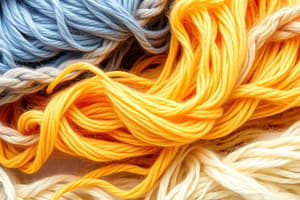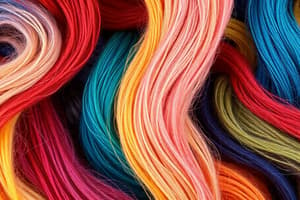Podcast
Questions and Answers
What is fiber classification?
What is fiber classification?
- A technique used in spinning yarn
- A method of weaving fabrics
- The process of sorting different types of fibers (correct)
- A tool used for measuring fiber length
What is a fiber?
What is a fiber?
A slender and greatly elongated substance capable of being spun into yarn.
What is yarn?
What is yarn?
A long continuous length of interlocked fibers, suitable for use in the production of textiles.
What is thread?
What is thread?
What is a filament?
What is a filament?
What is a textile fiber?
What is a textile fiber?
What is the property of length in fibers?
What is the property of length in fibers?
What are plant fibers?
What are plant fibers?
What are animal fibers?
What are animal fibers?
What are mineral fibers?
What are mineral fibers?
What are man-made fibers?
What are man-made fibers?
What are regenerated fibers?
What are regenerated fibers?
What are synthetic fibers?
What are synthetic fibers?
Study Notes
Fiber Classification
- Fibers can be classified based on their origin and characteristics.
- Key categories: Natural, Regenerated, and Synthetic fibers.
Fiber
- Defined as a slender, elongated substance suitable for spinning into yarn.
- Characterized by specific lengths, typically between 100-1000mm for textile use.
Yarn
- A long continuous length of interlocked fibers used in textiles production.
Thread
- Composed of multiple twisted yarns, often used for stitching and sewing.
Filament
- Distinct from other fibers, filament has an undefined and continuous length.
Textile Fiber
- A fiber that can be transformed into yarn or processed into various textile forms, including woven or knit fabrics.
Properties of Textile Fibers
- Fibers are evaluated on various properties such as length, durability, and elasticity, which influence their suitability for textiles.
Natural Fibers
- Derived from plant or animal sources.
- Includes Plant fibers like cotton, flax, kapok, and jute.
Plant Fibers
- Sourced from plant materials, commonly used in textiles.
Animal Fibers
- Sourced from animals, including wool, silk, and rabbit hair.
Mineral Fibers
- Obtained from minerals, with asbestos being a prime example.
Man-Made Fibers
- Designed through human intervention, falling into two main subcategories: Regenerated and Synthetic fibers.
Regenerated Fibers
- Contain a natural base that is chemically processed, examples include viscose rayon, acetate rayon, triacetate rayon, tencel, and bamboo.
Synthetic Fibers
- Created through purely chemical processes, utilizing two or more chemicals. Examples include polyester, acrylic, glass fiber, metal fiber, and nylon.
Studying That Suits You
Use AI to generate personalized quizzes and flashcards to suit your learning preferences.
Description
Test your knowledge on fiber classification with these flashcards. Each card provides essential definitions related to fibers, yarn, and threads. Perfect for anyone studying textiles or looking to enhance their understanding of fiber types.



